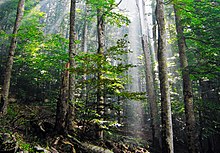silva
English
[edit]Etymology
[edit]Borrowed from Latin silva. Doublet of selva.
Noun
[edit]silva (plural silvas or silvae)
- (forestry) The forest trees of a particular area
- 1909, Willis Linn Jepson, The Trees of California, page 13:
- The most interesting and striking features of the silva of California relate to its composition, the geographical distribution of the species and their biological history.
Alternative forms
[edit]Related terms
[edit]- sylvan (see for more terms)
Anagrams
[edit]Galician
[edit]
Etymology
[edit]From Old Galician-Portuguese silva, from Latin silva (“forest”).
Pronunciation
[edit]Noun
[edit]silva f (plural silvas)
- bramble, blackberry bush
- 1460, José Antonio Souto Cabo, editor, Crónica de Santa María de Íria, Santiago: Ediciós do Castro, page 101:
- vijã grande[s] lumes de candeas arder de noyte et de dia en huũ monte muy espeso de muytas aruores et siluas, a oyto mjlias de Yria
- they saw large candle fires, burning day and night, in a very close forest, of trees and bambles, eight milles from Iria
- 1884, Marcial Valladares Núñez, Diccionario gallego-castellano, s.v. silva:
- Tente, silva; non me prendas, que n'estou n'a miña tèrra (traditional song)
- Hold yourself, bramble, don't catch me, 'cos I'm not in my country
- (archaic) forest
- white stripe on a horse head
Related terms
[edit]References
[edit]- Ernesto Xosé González Seoane, María Álvarez de la Granja, Ana Isabel Boullón Agrelo (2006–2022) “silua”, in Dicionario de Dicionarios do galego medieval (in Galician), Santiago de Compostela: Instituto da Lingua Galega
- Xavier Varela Barreiro, Xavier Gómez Guinovart (2006–2018) “silua”, in Corpus Xelmírez - Corpus lingüístico da Galicia medieval (in Galician), Santiago de Compostela: ILG
- Antón Luís Santamarina Fernández, editor (2006–2013), “silva”, in Dicionario de Dicionarios da lingua galega [Dictionary of Dictionaries of the Galician language] (in Galician), Santiago de Compostela: Instituto da Lingua Galega
- Antón Luís Santamarina Fernández, Ernesto Xosé González Seoane, María Álvarez de la Granja, editors (2003–2018), “silva”, in Tesouro informatizado da lingua galega (in Galician), Santiago de Compostela: Instituto da Lingua Galega
- Rosario Álvarez Blanco, editor (2014–2024), “silva”, in Tesouro do léxico patrimonial galego e portugués (in Galician), Santiago de Compostela: Instituto da Lingua Galega, →ISSN
Latin
[edit]
Alternative forms
[edit]Etymology
[edit]Traditionally derived from Proto-Indo-European *sel-, *swel- (“firewood, wood, beam, board, frame, threshold”), and compared with Ancient Greek ὕλη (húlē, “wood, timber”) and Old English syl (“sill, threshold, foundation”). However, De Vaan is implicitly skeptical of this derivation, and leaves the origin open.
Pronunciation
[edit]- (Classical Latin) IPA(key): /ˈsil.u̯a/, [ˈs̠ɪɫ̪u̯ä]
- (modern Italianate Ecclesiastical) IPA(key): /ˈsil.va/, [ˈsilvä]
Noun
[edit]silva f (genitive silvae); first declension
Declension
[edit]First-declension noun.
| Case | Singular | Plural |
|---|---|---|
| Nominative | silva | silvae |
| Genitive | silvae | silvārum |
| Dative | silvae | silvīs |
| Accusative | silvam | silvās |
| Ablative | silvā | silvīs |
| Vocative | silva | silvae |
Derived terms
[edit]Descendants
[edit]References
[edit]- “silva”, in Charlton T. Lewis and Charles Short (1879) A Latin Dictionary, Oxford: Clarendon Press
- “silva”, in Charlton T. Lewis (1891) An Elementary Latin Dictionary, New York: Harper & Brothers
- silva in Charles du Fresne du Cange’s Glossarium Mediæ et Infimæ Latinitatis (augmented edition with additions by D. P. Carpenterius, Adelungius and others, edited by Léopold Favre, 1883–1887)
- silva in Gaffiot, Félix (1934) Dictionnaire illustré latin-français, Hachette.
- Carl Meißner, Henry William Auden (1894) Latin Phrase-Book[1], London: Macmillan and Co.
- wooded hills: montes vestiti silvis
- wooded hills: montes vestiti silvis
- De Vaan, Michiel (2008) Etymological Dictionary of Latin and the other Italic Languages (Leiden Indo-European Etymological Dictionary Series; 7), Leiden, Boston: Brill, →ISBN, page 564
Portuguese
[edit]
Pronunciation
[edit]
Etymology 1
[edit]From Old Galician-Portuguese silva, from Latin silva, from Proto-Indo-European *swel-, *sel- (“mountain, ridge, forest”). Compare the doublet selva and Galician silva.
The /i/ is puzzling. Philologist Leite de Vasconcelos felt that the word was not a Latinism and conjectured a term spīna *silvea with the same suffix as ligneus and pīneus, where the close post-tonic vowel would cause the stressed vowel to rise, as in marisma and sirgo.[1]
Noun
[edit]silva f (plural silvas)
- bramble (any of various thorny shrubs, especially those in the family Rubus)
- Synonyms: espinheiro, sarça
- (in particular) blackberry (Rubus fruticosus)
- Synonyms: amoreira, amora-silvestre, amoreira-silvestre
Etymology 2
[edit]See the etymology of the corresponding lemma form.
Verb
[edit]silva
- inflection of silvar:
References
[edit]- ^ 1920, Leite de Vasconcellos, Revista Lusitana, volume 23, page 188
Romanian
[edit]Noun
[edit]silva f
Tok Pisin
[edit]| Chemical element | |
|---|---|
| Ag | |
Etymology
[edit]Noun
[edit]silva
- English terms borrowed from Latin
- English terms derived from Latin
- English doublets
- English lemmas
- English nouns
- English countable nouns
- English nouns with irregular plurals
- en:Forestry
- English terms with quotations
- Galician terms inherited from Old Galician-Portuguese
- Galician terms derived from Old Galician-Portuguese
- Galician terms derived from Latin
- Galician terms with IPA pronunciation
- Galician lemmas
- Galician nouns
- Galician countable nouns
- Galician feminine nouns
- Galician terms with quotations
- Galician terms with archaic senses
- Latin terms derived from Proto-Indo-European
- Latin 2-syllable words
- Latin terms with IPA pronunciation
- Latin lemmas
- Latin nouns
- Latin first declension nouns
- Latin feminine nouns in the first declension
- Latin feminine nouns
- Latin words in Meissner and Auden's phrasebook
- la:Nature
- la:Places
- Portuguese 2-syllable words
- Portuguese terms with IPA pronunciation
- Portuguese terms with homophones
- Portuguese terms inherited from Old Galician-Portuguese
- Portuguese terms derived from Old Galician-Portuguese
- Portuguese terms derived from Latin
- Portuguese terms derived from Proto-Indo-European
- Portuguese doublets
- Portuguese lemmas
- Portuguese nouns
- Portuguese countable nouns
- Portuguese feminine nouns
- Portuguese non-lemma forms
- Portuguese verb forms
- Romanian non-lemma forms
- Romanian noun forms
- tpi:Chemical elements
- Tok Pisin terms derived from English
- Tok Pisin lemmas
- Tok Pisin nouns
